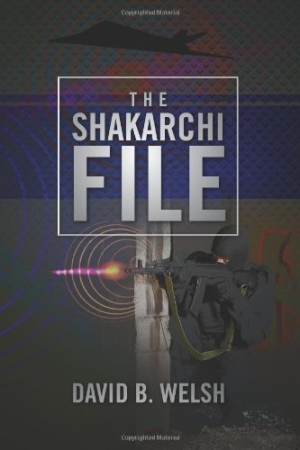The Shakarchi File
Retired vascular surgeon David B. Welsh has stepped far from the operating room with his new novel, The Shakarchi File. In a topical story involving the Department of Homeland Security, the FBI, and a group of Middle Eastern terrorists in the US, Welsh presents a carefully plotted, winding tale of improbable federal agents and an equally improbable potential terrorist who may have simply too much to lose. The novel provides an intriguing romp through a world of supercomputers, young and eager technical specialists, arms dealers, extremists, and agencies entrusted with keeping America safe from terrorism. Even if a bit of a stretch sometimes, it is a clever, well-written story.
Welsh develops his main character quite thoroughly. Jafar Shakarchi is an eleven-year-old growing up in Baghdad when he loses his family in an American bombing. Jafar is eventually taken in by relatives in the States, who raise him as their own and give him a stable, loving household and a solid education. With a doctorate in hand, he works as a computer engineer for a large American firm. He wants to marry his Iraqi-American girlfriend, but memories of his past convince him that there is something he must accomplish first: avenge the deaths of his family. “Fixated on exacting revenge,” not caring “if it were the military or a government agency or the police,” Jafar also wants no part in harming innocent bystanders. His future as a full-blown terrorist is not likely.
Other characters, specifically a group of on-call Homeland Security analysts, are not as well developed individually, but as an interchangeable group, they suffice. One-time graduate students who “accidentally stumbled on an industrial espionage scheme” and “managed to catch the…spies running it,” they are all hired and trained to be ready when Homeland Security needs them. Called in when the department needs assistance in tracking down a man who turns out to be Shakarchi, they suddenly become gun-toting agents, even participating in a raid on an extremist group of arms dealers. Their presence and actions are often questionable, but they serve as a means to connect various aspects of the story, and, as such, they are essential to its momentum.
The Shakarchi File contains some unexpected but interesting information about computers, even offering a simplified explanation of relativity versus quantum theory. Artificial intelligence serves not merely as an undercurrent but almost as another character throughout the book. Technology, including one agency’s supercomputer, is in evidence everywhere. Telephone taps and automobile tracking devices are the simple stuff; the people here are using far more advanced technology, not only to find what they need but also to prevent the worst sorts of events from happening. The applications are intriguing.
Welsh’s book is so carefully plotted and so nicely written that it seems a shame that the text is marred by numerous simple errors. The reviewed book is a proof copy, so perhaps these issues have been addressed. Word and word-ending drops occur several dozen times: “he brings home from all indicate,” “the van where he seen people,” and “when we down at Quantico” come across as sloppy. Other mistakes, including “alright” for “all right” and the interchangeable use of “hanger” and “hangar,” as well as spacing errors on lines following quotations, could all be easily fixed with a final edit. The Shakarchi File is a good book, and its presentation deserves to be, too.
Reviewed by
Cheryl Hibbard
Disclosure: This article is not an endorsement, but a review. The publisher of this book provided free copies of the book and paid a small fee to have their book reviewed by a professional reviewer. Foreword Reviews and Clarion Reviews make no guarantee that the publisher will receive a positive review. Foreword Magazine, Inc. is disclosing this in accordance with the Federal Trade Commission’s 16 CFR, Part 255.

